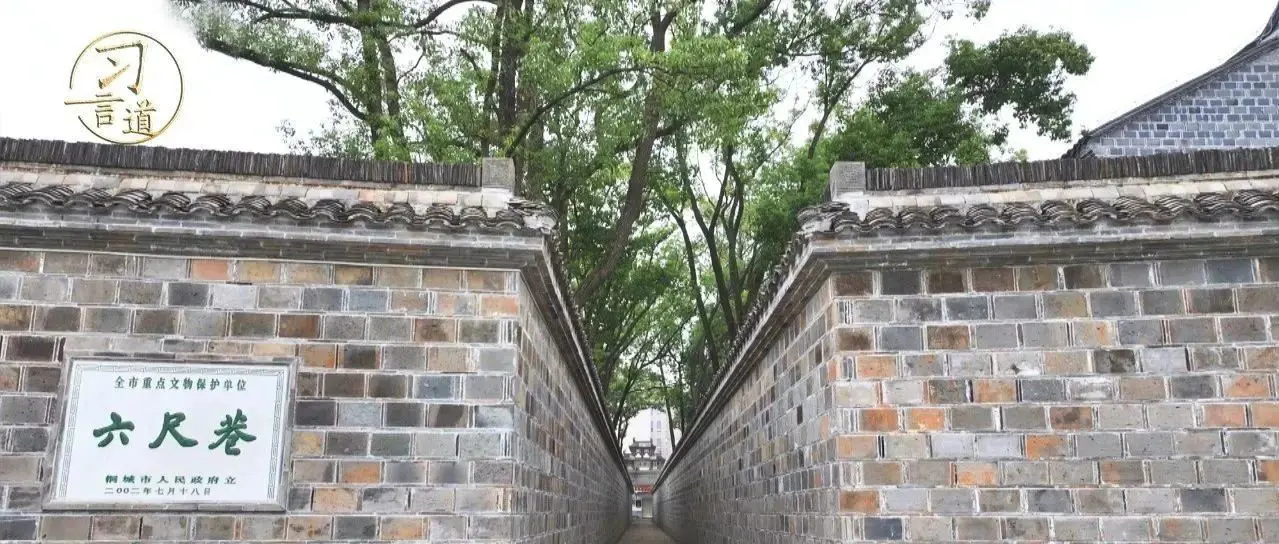During his inspection in Anhui, why did Xi Jinping visit the Six-Foot Lane?

In the southwest corner of Tongcheng, Anhui, there is a narrow alley about 100 meters long and 2 meters wide. At both ends of the alley stand stone archways, one of which is inscribed with the word "Courtesy."
This is the famous Six-Foot Lane of Tongcheng.
On a certain date, during his inspection tour in Anhui, President Xi Jinping visited the Six-Foot Lane, revisited the story of Zhang and Wu's mutual courtesy, and inspected the exhibition on Tongcheng's historical and cultural heritage.
"Zhang Wu Li Rang" is a touching story behind the Six-foot Lane.
According to historical records, during the reign of Emperor Kangxi of the Qing Dynasty, Zhang Ying, a Grand Secretary of the Wenhua Hall, was serving in the capital when his relatives from Tongcheng, his hometown, had a dispute with the Wu family over the land for a house. The Zhang family wrote to Zhang Ying for help.
After learning about the situation, Zhang Ying immediately composed a poem for his family: "A single letter came only for a wall, letting him have three feet, what harm would it do? The Great Wall, stretching ten thousand miles, still stands today, but the First Emperor of Qin is no more to be seen."
Upon receiving the poetic letter, the family suddenly understood and voluntarily gave up three feet of their boundary wall. Deeply touched, the neighbor also retreated three feet. Thus, the "Six-Foot Lane" was named, and the story of "Zhang and Wu's Courtesy" has been passed down through the ages, becoming a symbol of the traditional virtues of humility, courtesy, and harmonious coexistence.
Come here and take a look, it's very touching.
During a visit to Six-foot Lane, Xi Jinping said that Six-foot Lane embodies the historical wisdom of the ancients in China, and it is important to promote the traditional virtues of the Chinese nation, practice mutual courtesy, prioritize harmony, address livelihood issues well, resolve social conflicts, and make our society more harmonious.
How to blend the ancient with the modern, how to draw wisdom for modern social governance from the excellent traditional culture—Xi Jinping has made it clear in one statement.
The profound and extensive Chinese civilization is the unique spiritual symbol of the Chinese nation. Xi Jinping has always been deeply concerned about excavating the ideological concepts, humanistic spirit, and moral norms of China's excellent traditional culture, and activating the vitality of the excellent traditional culture.
He once spoke about Confucius and Confucianism research at the Confucius Mansion in Qufu, Shandong, "Adhering to the principle of using the ancient for the modern, refining the essence, discarding the false and retaining the true, guiding according to circumstances, and deepening research," "so that it can play a positive role under new historical conditions."
He once emphasized cultural confidence at the Zhu Xi Garden in Wuyi Mountain, Fujian, "Without the five thousand years of Chinese civilization, where would the characteristics of socialism with Chinese features come from? If not for these Chinese characteristics, how could we have achieved such a successful path of socialism with Chinese characteristics today?"
He once visited the San Su Ancestral Hall in Meishan, Sichuan, to learn about the main literary achievements of the San Su and their family traditions. "We must revere the excellent traditional Chinese culture" and "We should be good at drawing ideas and thinking for governance from the excellent traditional Chinese culture."
During this visit to Six-foot Lane, Xi Jinping emphasized the need to strengthen the protection of historical and cultural heritage, adhere to creative transformation and innovative development, and work together to advance the development of socialist advanced culture, promote revolutionary culture, and inherit the excellent traditional Chinese culture, thereby laying a solid cultural foundation for social governance.
Discussing the past and present, it is filled with philosophical reflections on history.
Ten years ago, Xi Jinping once said at the opening ceremony of the International Academic Symposium on the Anniversary of Confucius' Birthday and the Fifth Membership Congress of the International Confucian Association:
We should inherit and carry forward the elements of traditional culture that are suitable for adjusting social relationships and encouraging people to strive for the better, and endow them with new meanings in light of the conditions of our times. We hope that scholars from China and other countries can exchange ideas and engage in mutual learning to thoroughly study this subject, so that the excellent traditional culture of China can work together with the outstanding cultures of other countries to benefit humanity.
Today, discussing the wisdom of ancient people at Six-foot Lane, Xi Jinping's focus remains on this major subject.

